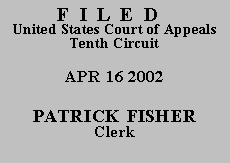

| DANIEL OSWALT, |
|
| v. | |
| STATE OF KANSAS and MARTIN ASHER, Atchison County District Court Judge, |
Daniel Oswalt, a state prisoner proceeding pro se, requests a certificate of appealability ("COA") to appeal the denial of his 28 U.S.C. § 2254 habeas corpus petition. The district court denied Mr. Oswalt's petition as untimely. Because he is proceeding pro se, we construe Mr. Oswalt's allegations liberally. See Haines v. Kerner, 404 U.S. 519, 520-21 (1972) (per curiam). To determine whether Mr. Oswalt is entitled to a COA when the district court has denied a habeas petition on procedural grounds, we examine whether he has made a substantial showing "that jurists of reason would find it debatable whether the petition states a valid claim of the denial of a constitutional right, and that jurists of reason would find it debatable whether the district court was correct in its procedural ruling." Slack v. McDaniel, 529 U.S. 473, 478 (2000) (construing 28 U.S.C. § 2253(c)).
Mr. Oswalt was convicted of possession of methamphetamine with intent to sell within 1,000 feet of a school, possession of drug paraphernalia, and failure to affix a drug tax stamp. His conviction was affirmed by the Kansas Court of Appeals on October 15, 1999, and the Kansas Supreme Court denied his petition for review on December 22, 1999. Pursuant to AEDPA, the district court determined that Mr. Oswalt's appeal became final on March 22, 2000, ninety days after the Kansas Supreme Court's denial of his appeal, the conclusion of the period for filing a petition for a writ of certiorari to the United States Supreme Court. See 28 U.S.C. § 2244 (AEDPA's statute of limitations); Caspari v. Bohlen, 510 U.S. 383, 390 (1994) ("A state conviction and sentence become final . . . when the availability of direct appeal to the state courts has been exhausted and the time for filing a petition for a writ of certiorari has elapsed or a timely filed petition has been finally denied."); Burleson v. Saffle, 278 F.3d 1136, 1139 n.2 (10th Cir. 2000).
Mr. Oswalt filed his § 2254 petition on March 29, 2001. The district court dismissed his petition as untimely and undeserving of equitable tolling. Mr. Oswalt does not dispute the belated filing date, but contends that he is entitled to equitable tolling for lack of access to legal materials.
"AEDPA's one-year statute of limitations is subject to equitable tolling but only in rare and exceptional circumstances." Gibson v. Klinger, 232 F.3d 799, 808 (10th Cir.2000) (quotation omitted). An inmate may be entitled to equitable tolling if he "diligently pursues his claims and demonstrates that the failure to timely file was caused by extraordinary circumstances beyond his control." Marsh v. Soares, 223 F.3d 1217, 1220 (10th Cir. 2000), cert. denied, 531 U.S. 1194 (2001).
Here, Mr. Oswalt maintains that he had submitted portions of his research and legal materials to the Kansas Defender Project, that the Project retained the materials, and thus he was unable to prepare his petition. Although an extreme deprivation of access to an inmate's legal materials may constitute grounds for equitable tolling, there was no such deprivation here. The record indicates that the Defender Project returned Mr. Oswalt's legal materials on December 11, 2000, which provided him with more than three months to prepare his petition.
When, as here, a claim is denied on procedural grounds without reaching the merits of the underlying constitutional claim, a COA should issue only if the petitioner shows that "jurists of reason would find it debatable whether the district court was correct in its procedural ruling." Slack, 529 U.S. at 478. Mr. Oswalt has made no such showing, and we therefore DENY his request for a COA and DISMISS the appeal.
Entered for the Court,
Robert H. Henry
Circuit Judge
*. This order and judgment is not binding precedent, except under the doctrines of res judicata, collateral estoppel, and law of the case. The court generally disfavors the citation of orders and judgments; nevertheless, an order and judgment may be cited under the terms and conditions of 10th Cir. R. 36.3.